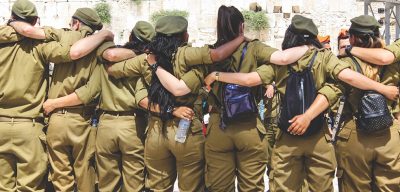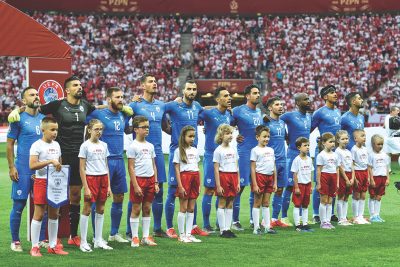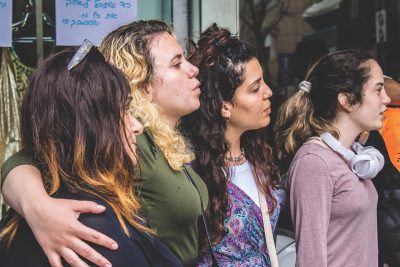×


We have detected your country as:
Please click here to go to the USA website or select another country from the dropdown list.
by: Cheryl Hauer, International Vice President
There is something wonderfully moving about standing among Israelis as their national anthem is sung. As you hear the passion in their voices and see the tears in many eyes, you realize how the words of the “Hatikvah” (The Hope) have shaped the thinking of a nation and helped keep the Zionist dream alive for generations. The song itself has an interesting history. And as Israel’s position among the nations changes, some say it’s time for a reinterpretation.
Throughout history, “Hatikvah” has caused numerous arguments and debates. Theodore Herzl hated it, religious Zionists and secular socialists fought over it, Israeli Arabs called it racist and international contests were held to find a replacement for it. But all efforts to remove it from its place of honor were unsuccessful. “Hatikvah” had worked its way into the hearts of Israelis, beginning with the earliest Zionist pioneers who found in it the expression of the centuries-old Jewish longing for their ancient homeland.
 The Words
The WordsThe history of both the melody and the lyrics of “Hatikvah” is, much like the State of Israel, fraught with controversy. The story begins with Jewish poet, Naftali Herz Imber, born in 1856 in what was then part of the Austro–Hungarian Empire. Imber was raised in a religious home and revealed himself as a prodigy when he began his career as a poet aged 10. Not yet in his teens, he wrote prolifically and even received an award from the emperor.
At 25, Imber left his religious roots and moved to Israel where, in 1886, he published his first book of poems entitled Barkai (Morning Star). Among the collection of poems was a nine-stanza verse called “Tikvateynu” (Our Hope). Passionately Zionistic, it touched the soul of the Jewish people. Sources say that Imber travelled across the Promised Land, sharing his poetry—and particularly “Tikvateynu”. Unfortunately, however, he developed a reputation as a drunkard and a womanizer. Imber died in New York in 1909 and was buried in a pauper’s grave. In 1953, he was reinterred at the Har HaMenuchot Cemetery in Jerusalem, the prodigal poet at last at rest in the Zion he loved.
 By the time Imber moved to America, his poem had become a song. The early Jewish pioneers created a culture imbued with singing and dancing. Among those songs was “Hatikvah,” a song so beloved that it became the theme song of the Zionist movement. Its route from poem to song was somewhat circuitous, however.
By the time Imber moved to America, his poem had become a song. The early Jewish pioneers created a culture imbued with singing and dancing. Among those songs was “Hatikvah,” a song so beloved that it became the theme song of the Zionist movement. Its route from poem to song was somewhat circuitous, however.
Many believe that the melody goes back more than 500 years to a Sephardic prayer for dew called the “Birkat Ha’Tal.” The haunting melody then made its way to Italy, where it became a popular love song, and from there to Romania, where it became a Gypsy folk song. It also provided the melody for Polish, Ukrainian and Spanish folk songs, and was the basis of composer Bedrich Smetana’s symphonic poem celebrating “Bohemia.” Then, in 1888, 17-year-old Samuel Cohen arrived in the burgeoning Jewish homeland from Romania, bringing with him a folk song he remembered from his childhood, which he adapted to “Hatikvah.” The rest, as they say, is history.
 As popular as “Hatikvah” was with the masses, not all Zionists favored it. Herzl objected to the song on several levels. He was troubled by Imber’s reputation as a “vagabond” and a “drunkard,” believing that the composer of the Jewish homeland’s anthem should be someone of higher moral standards. In 1897, he launched the first of several unsuccessful international competitions to find a more suitable replacement.
As popular as “Hatikvah” was with the masses, not all Zionists favored it. Herzl objected to the song on several levels. He was troubled by Imber’s reputation as a “vagabond” and a “drunkard,” believing that the composer of the Jewish homeland’s anthem should be someone of higher moral standards. In 1897, he launched the first of several unsuccessful international competitions to find a more suitable replacement.
Israel Story podcaster Zev Levi recounts that at the Sixth Zionist Congress in 1903, the Uganda Proposal to create a temporary Jewish State in eastern Africa was discussed. The proposal passed with 295 in favor and 178 against. Its opponents got up and sang “Hatikvah,” stressing the lyrics “the eye looks toward Zion.” Thus, Levi observed, “a Hebrew poem penned by a misfit and stuck to a random Romanian Gypsy tune, became the unlikely political anthem of a country that did not yet exist.”
Religious Zionists objected to the absence of reference to God or the spiritual nature of Zionism in Imber’s verse. A secular song could hardly be the anthem for a nation founded on a belief in God and the fulfillment of His promises. Rabbi Abraham Isaac Kook actually penned a parallel poem called “The Faith,” stressing “the steadfast faith in the return to our holy land where we shall serve our God.” Socialist Zionists objected to both Imber and Kook’s works and suggested “Birkat Ha’Am” (The People’s Blessing) which reads, “Strengthen the hands of our brothers renewing the soil of our land.” And cultural Zionists objected to the minor key of “Hatikvah” which, they said, made the song “gloomy and depressing.”
Despite the objections, “Hatikvah” survived as a symbol of the Jewish spirit, nationhood and Israeli identity. It was sung every year at annual Zionist congresses, until it was adopted as the official anthem of the Zionist movement 1933. It wasn’t until 2004, however, that a Knesset (Parliament) vote officially designated the song as the Israeli national anthem. Yet even without that designation, the Jewish people sang “Hatikvah” in times of horror and joy.
Recently, Times of Israel blogger David Matlow has suggested another look at “Hatikvah.” Reporting on President Isaac Herzog’s speech to a Joint Session of the US Congress, he suggested that the president had challenged the Jewish people to redefine the notions of Zionism as expressed in the song. The president spoke of reinterpreting “Hatikvah” from “to be a free nation in our land” to “healing a fractured world.” Now that the impossible dream of independence has been realized, Matlow argues, it is time for a new hope and a new vision, not to replace the old but to build upon it. It is a demand for the Jewish nation to reach beyond its borders and do what it can to make the world a place of justice and compassion.
The original Imber poem read: “The ancient hope, To return to the land of our fathers, The city where David encamped.” In 1895, David Yellin, a scholar in the newly-reborn Hebrew language, changed the lyrics to the ones we sing today. Perhaps it is time, Matlow suggests, that they are changed again.
Photo Credit: Click on photo for photo credit
All logos and trademarks in this site are property of their respective owner. All other materials are property of Bridges for Peace. Copyright © 2025.
Website Site Design by J-Town Internet Services Ltd. - Based in Jerusalem and Serving the World.